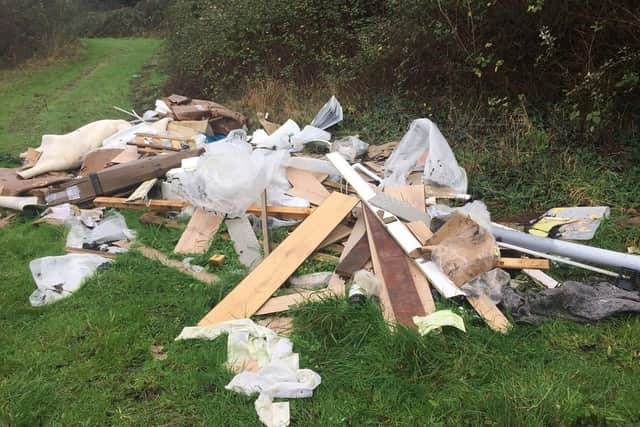Eastbourne fly-tipping figures see big increase in data revealed by Defra
and live on Freeview channel 276
Overall the data from the Department for Environment, Food and Rural Affairs (Defra) shows that incidents of fly-tipping on public land has increased by 16 per cent in 2020/21 across England.
Looking into the figures it was revealed there were a total of 919 incidents of fly-tipping in Eastbourne in 2020/21 that were reported to the local authority, that’s a 75 per cent rise when compared with figures in 2019/20.
Advertisement
Hide AdAdvertisement
Hide AdAcross England, councils dealt with 1.13 million fly-tipping incidents during this period because recycling centres shut during the pandemic and enforcement staff in many areas were furloughed.


There were a total of 187 recorded actions in response to these 919 incidents in Eastbourne – that’s 20.34 per cent of incidents being followed up with enforcement actions.
The Country Land & Business Association (CLA) – which represents 28,000 rural businesses across England and Wales – believes the actual figures around fly-tipping are much higher as this data only looks at waste illegally dumped on public land which is reported to the authorities.
CLA revealed the majority of incidents occur on private land. CLA regional director Tim Bamford said, “These figures do not tell the full story of this disgraceful behaviour which blights our beautiful countryside.
Advertisement
Hide AdAdvertisement
Hide Ad“Local authorities tend not to get involved with clearing incidences of fly-tipped waste from private land, leaving the landowner to clean up and foot what is often an extortionate bill.”


One member of CLA is facing a bill of more than £100,000 to clear up one ‘particularly shocking’ incident.
Mr Bamford said, “The government figures do not reflect the true scale of the crime because increasing reports of fly-tipping on private rural land are not included.
“Fly-tipping continues to wreck the lives of many of us living and working in the countryside – and significant progress needs to be made to stop it. It’s not just the odd bin bag but large household items, from unwanted sofas to broken washing machines, building materials and even asbestos being dumped across our countryside.
Advertisement
Hide AdAdvertisement
Hide Ad“Although the maximum fine for anyone caught fly-tipping is £50,000 or 12 months’ imprisonment, if convicted in a Magistrates’ Court, this is rarely enforced. Unless tougher or more realistic action is taken to combat this kind of rural crime, it will continue to wreak devastation across rural communities This is why it’s crucial that tougher punishments are imposed by the courts.”
A spokesperson for Eastbourne Borough Council said, “Across the country, local authorities saw an increase in fly-tipping last year, particularly when household waste sites were closed during lockdown.
“We take every case of fly-tipping reported to us seriously and, wherever possible, Neighbourhood First officers investigate for evidence that may identify who is responsible.
“We are pro-active in bringing to justice anyone who creates an eyesore by illegal dumping in our town.
Advertisement
Hide AdAdvertisement
Hide Ad“In the three months from July to September this year we fined eight people a total of £1,625 for fly-tipping.
“It is not always possible to discover who is to blame for fly-tipping but we remain vigilant in punishing anyone we find acting in this anti-social manner.
“We encourage people to report cases using the Report It smartphone app or on our website.
For more information about the CLA and its work, visit https://www.cla.org.uk/in-your-area/south-east/